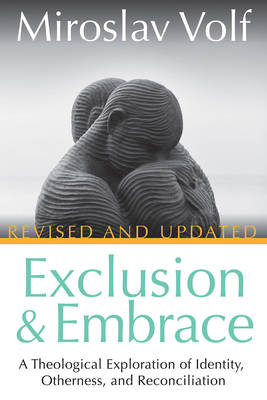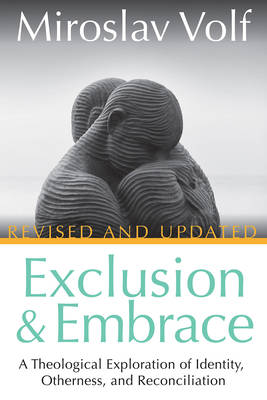
En raison d'une grêve chez bpost, votre commande pourrait être retardée. Vous avez besoin d’un livre rapidement ? Nos magasins vous accueillent à bras ouverts !
- Retrait gratuit dans votre magasin Club
- 7.000.000 titres dans notre catalogue
- Payer en toute sécurité
- Toujours un magasin près de chez vous
En raison de la grêve chez bpost, votre commande pourrait être retardée. Vous avez besoin d’un livre rapidement ? Nos magasins vous accueillent à bras ouverts !
- Retrait gratuit dans votre magasin Club
- 7.000.0000 titres dans notre catalogue
- Payer en toute sécurité
- Toujours un magasin près de chez vous
Exclusion and Embrace, Revised and Updated
A Theological Exploration of Identity, Otherness, and Reconciliation
Miroslav Volf
Livre relié | Anglais
55,45 €
+ 110 points
Format
Description
Life in the twenty-first century presents a disturbing reality. Otherness, the simple fact of being different in some way, has come to be defined as in and of itself evil. Miroslav Volf contends that if the healing word of the gospel is to be heard today, Christian theology must find ways of speaking that address the hatred of the other. Is there any hope of embracing our enemies? Of opening the door to reconciliation? Reaching back to the New Testament metaphor of salvation as reconciliation, Volf proposes the idea of embrace as a theological response to the problem of exclusion. Increasingly we see that exclusion has become the primary sin, skewing our perceptions of reality and causing us to react out of fear and anger to all those who are not within our (ever-narrowing) circle. In light of this, Christians must learn that salvation comes, not only as we are reconciled to God, and not only as we "learn to live with one another," but as we take the dangerous and costly step of opening ourselves to the other, of enfolding him or her in the same embrace with which we have been enfolded by God. Volf won the 2002 Louisville Grawemeyer Award in Religion for the first edition of his book, Exclusion & Embrace: A Theological Exploration of Identity, Otherness, and Reconciliation (Abingdon, 1996). In that first edition, professor Volf, a Croatian by birth, analyzed the civil war and "ethnic cleansing" in the former Yugoslavia, and he readily found other examples of cultural, ethnic, and racial conflict to illustrate his points. Since September 11, 2001, and the subsequent epidemic of terror and massive refugee suffering throughout the world, Volf revised Exclusion and Embrace to account for the evolving dynamics of inter-ethnic and international strife.
Spécifications
Parties prenantes
- Auteur(s) :
- Editeur:
Contenu
- Nombre de pages :
- 410
- Langue:
- Anglais
Caractéristiques
- EAN:
- 9781501896255
- Date de parution :
- 20-08-19
- Format:
- Livre relié
- Format numérique:
- Genaaid
- Dimensions :
- 152 mm x 234 mm
- Poids :
- 725 g

Les avis
Nous publions uniquement les avis qui respectent les conditions requises. Consultez nos conditions pour les avis.






